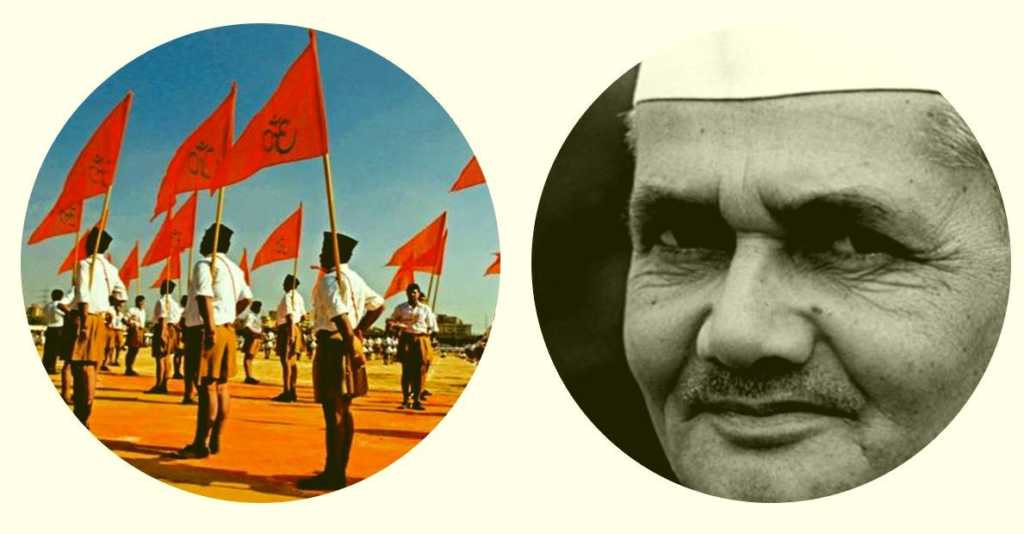Lal Bahadur Shastri was the second Prime Minister of India who was in office from May 1964 to January 1966. He was the Prime Minister of the country at a crucial juncture in Indian political history till his mysterious death in Tashkent on 11 January 1966. He led the country impressively during the 1965 Indo-Pak war when he had given the green signal to the Indian Army to cross the international border in Punjab. The Army had then reached the outskirts of Lahore, reaching close to the Lahore airport.
Lal Bahadur Shastri, it has now come to light, was not opposed to the RSS or its ideology and in fact preferred to take the RSS and its leadership onboard on important issues of the country. Senior BJP leader L K Advani has said that unlike Jawaharlal Nehru, Lal Bahadur Shastri was not “ideologically hostile” to the RSS.
Advani has revealed that Lal Bahadur Shastri used to often invite Shri Guruji (the then RSS Sarsanghchalak M S Golwalkar) for consultation on national issues. Writing an article for the English weekly magazine Organiser in which L K Advani quoted an excerpt from his autobiography My Country My Life. “Unlike Nehru, Shastri did not harbor any ideological hostility towards the Jana Sangh and the RSS. He used to often invite Shri Guruji for consultation on national issues,” Advani said.
In the past few years, the presence of the RSS has increased all over India with more and more people wholeheartedly embracing the strong ideology, its nationalist credentials and stand on various social issues. With even the young people opting to support and join the RSS, the Left parties and organizations have been left frothing at the mouth but have been unable to counter it. It is evident by the dwindling support of the Congress and Communists, even in their strongholds and dubious stand on even the issues pertaining to national security.
While Congress and Communist leaders have continued to demean the institutions such as the Supreme Court, Election Commission and even the Indian Army, it has eagerly supported elements seeking to create disharmony and dissensions among different communities in the country. It is for this reason that their leaders have poohpoohed the surgical strikes carried out in the wake of the Uri attack in 2016, while simultaneously cheering those who have time and again abused and ridiculed India and called for its constituent units to break away from it. The RSS, its leaders and workers have steadfastly stood by and countered such nefarious activities of these nefarious forces, which want to break India territorially, socially and economically. When Congress, Communist and AAP leaders had embarrassed the country and stood by Pakistan after the surgical strikes carried out in 2016, the RSS Sarsanghchalak Shri Mohan Bhagwat had commended the action of the Indian Army to strike at terror camps across the border in Pakistan-Occupied-Kashmir.
Even in Kerala, where the average RSS worker, in spite of odds heavily against stacked him, is working relentlessly to unify the Hindu social fabric under the vindictive Communist Government in the state. In the process many RSS workers have been brutally killed by Communist thugs in the state and such killings are conveniently ignored by the liberal media which is a part of the extended ecosystem based in Delhi. In spite of such subversive conditions, the number of RSS shakhas has steadily increased in Kerala. In West Bengal, where the incumbent Chief Minister has unabashedly appeased minorities and giving them minorities immunity from facing the law while neglecting the grievances of the Hindus, more seem to be moving towards the RSS and placing their trust in the organization. Thousands of common people in Bengal have joined the RSS. Presently, the state of West Bengal has more than 1500 shakhas. In contrast, the number of RSS shakhas in Gujarat is around 1000.
While many detractors of the RSS hammer the fact that RSS was banned by Sardar Patel, they mischievously omit to point out that the same Sardar Patel had lifted the ban after a few months, since it does not suit their break-India narrative. After the 1962 India-China war (October-November), the then Prime Minister Jawaharlal Nehru was so impressed by the role of the RSS in the country during the war that he had asked the RSS volunteers to be a part of the Republic Day on January 26, 1963 at New Delhi barely 2 months later. L K Advani is right when he suggests that Lal Bahadur Shastri consulted the then RSS sarsanghchalak M S Golwalkar as it was Lal Bahadur Shastri, the man from a humble background like the present Prime Minister Narendra Modi, who had conveyed Jawaharlal Nehru’s message to the RSS to be a part of the Republic Day parade in 1963. It should come as no surprise then that while the Congress has forgotten the “nationalist” Lal Bahadur Shastri, it is the Rashtriya Swayamsevak Sangh and the BJP, which have brought Lal Bahadur Shastri back from near oblivion that the Congress and its ecosystem had relegated the common man who had rose through the ranks to become the Prime Minister of India.
